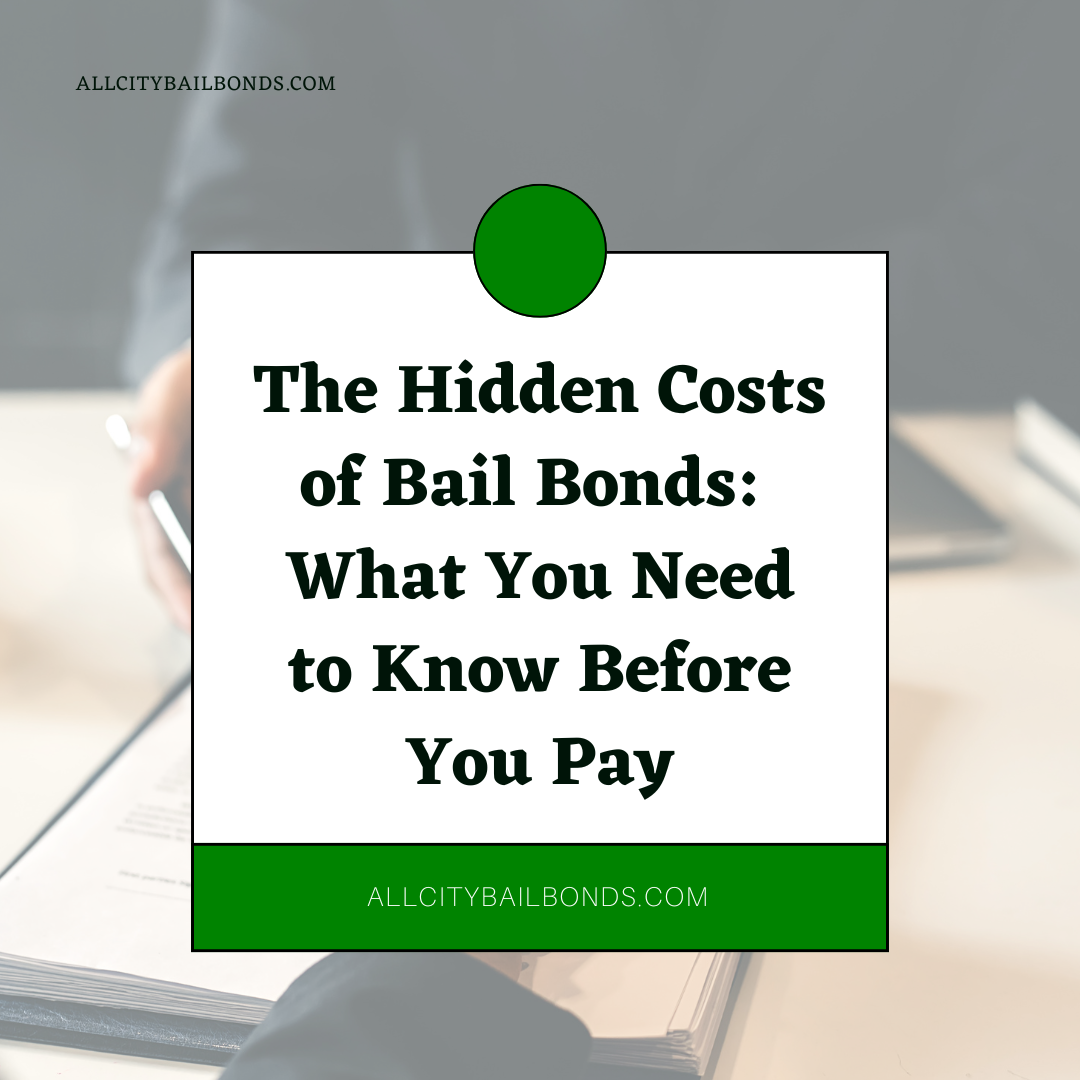
When faced with the need to post bail, most people think primarily about the upfront cost: the 10% fee charged by the bail bond company. However, there’s much more to consider financially, including hidden costs and potential long-term financial impacts that many don’t anticipate. While bail bond companies provide a crucial service by allowing individuals to secure their release from jail without paying the full bail amount, understanding the full financial picture is essential. In this article, we’ll explore the visible and hidden costs associated with bail bonds and offer tips to minimize financial strain.
The Visible Cost: Bail Bond Fees
The first cost most people associate with a bail bond is the fee charged by the bondsman. Typically, this is around 10% of the total bail amount. For example, if bail is set at $10,000, the bail bond company will charge $1,000 to post the bond, securing your release. This fee is non-refundable, even if the charges are dropped or if the defendant is found not guilty. While this fee is clearly stated up front, many individuals fail to account for other costs that can arise during the bail process.
Here at All City Bail Bonds, we have the lowest rates allowed by law: 8% instead of the usual 10% fee. This saves our clients 20% on the cost of bail!
Collateral Requirements: Risking Your Assets
In some cases, bail bond companies may require collateral in addition to the non-refundable fee. Collateral can take many forms, such as property, vehicles, or valuable personal belongings. The risk here is that if the defendant fails to appear in court or doesn’t comply with the terms of their bail, the collateral could be forfeited. Losing a car or even a home due to non-compliance can have devastating consequences, making it crucial to understand this potential cost before committing to a bail bond.
Lost Wages and Time Away from Work
One of the hidden costs of the bail process is the loss of income that can occur when someone is arrested and jailed, even for a short period. Many individuals who are arrested find themselves missing work, sometimes for several days. If bail isn’t posted quickly, the lost time can increase, leading to missed paychecks and, in some cases, job loss. Even after being released, defendants may need to take time off for court appearances, which can further disrupt their ability to earn an income.
Legal Fees and Additional Court Costs
While the bail bond itself doesn’t cover legal expenses, being released on bail often leads to additional costs down the road, including attorney fees and other court-related expenses. Defending a case, even if the charges are minor, can be expensive, and these legal costs add to the overall financial burden. In some instances, individuals may need to return to court several times, accruing additional fees for each appearance.
Emotional and Financial Stress on Families
Posting bail often requires the help of family members or friends. This financial collaboration can create emotional stress, particularly if collateral is involved. Family members may worry about the risk of losing their assets or facing financial difficulties due to the bond arrangement. Additionally, the strain of managing legal and financial challenges can take an emotional toll on families, leading to stress and conflict. Being transparent about the full scope of bail-related expenses can help alleviate some of this tension.
Travel and Accommodation Costs
Court appearances can require travel, especially for individuals who live far from the courthouse or have been arrested in a different state or city. Travel expenses can add up quickly, especially if the case drags on for several months. In some cases, families may also need to find accommodation near the courthouse, further increasing the financial burden.
Bail Bond Forfeiture: What Happens if You Miss Court?
One of the most significant financial risks associated with bail bonds is forfeiture, which occurs if the defendant fails to appear in court. If a bond is forfeited, the individual or their family is responsible for paying the full bail amount to the court. This is why it’s crucial for defendants to understand the importance of showing up to all scheduled court appearances. Missing court could mean that the $10,000 bond you only paid 10% of now becomes a $10,000 debt, leading to severe financial repercussions.
Minimizing Financial Strain: Tips for Managing the Costs of Bail
While posting bail can be financially daunting, there are steps you can take to minimize the impact on your finances:
-
Negotiate a Payment Plan: Some bail bond companies offer payment plans that allow you to spread out the cost over time. This can be particularly helpful for families who may not have the full 10% fee available upfront.
-
Use Personal Loans or Savings: If possible, consider using personal savings or securing a low-interest loan to cover bail costs rather than relying on high-interest credit cards, which can add to your financial burden.
-
Seek Legal Advice Early: Getting professional legal advice as soon as possible can help you understand your options and potentially avoid additional court appearances and costs.
-
Stay Organized and Meet All Court Dates: Ensuring that the defendant shows up to every court appearance is the simplest way to avoid bail bond forfeiture and the associated financial risks.
Conclusion
While posting bail may seem like a straightforward process, the financial implications can extend well beyond the initial 10% fee (or in our case, 8%!). Understanding the hidden costs and being prepared can help you and your family navigate this challenging situation more effectively. By considering collateral risks, lost wages, and potential forfeiture, you can better manage the bail process and protect your financial well-being.
If you want honest help understanding your bail situation, give us a call at 1-800-622-9991 for a 100% free bail consultation, where we help you understand the ins and outs of your bail situation and what your options are.
